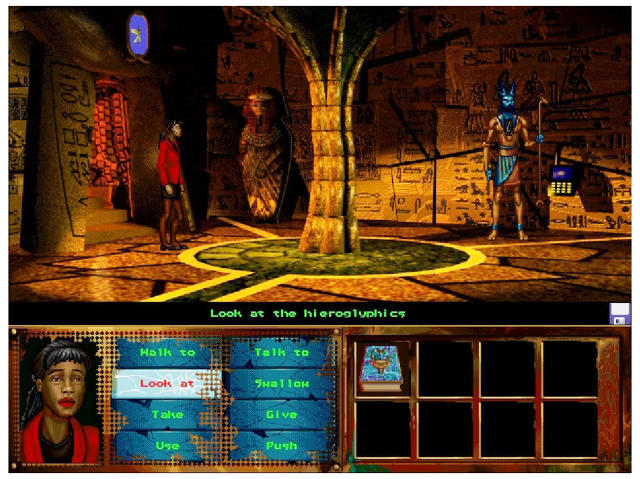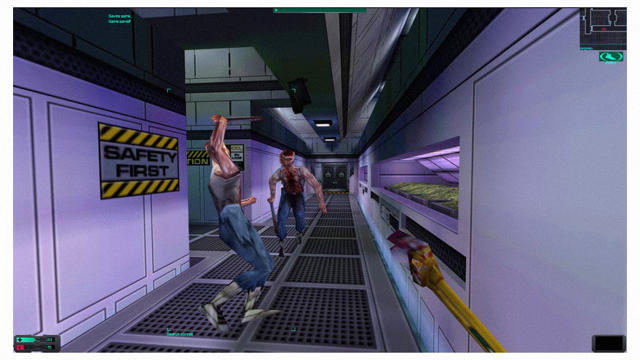HOW ONE COMPANY IS BRINGING OLD VIDEO GAMES BACK FROM THE DEAD
NIGHT DIVE STUDIOS GOT STARTED ON A WHIM. BUT IN LESS THAN THREE YEARS, IT’S GIVEN DOZENS OF GAMES A SECOND LIFE.
BY
JARED NEWMAN
"Stephen! This is Harlan Ellison!"
With a gruff tone, Stephen Kick is describing an unexpected phone call from one of his sci-fi heroes. Kick had been trying to license the rights for
I Have No Mouth, and I Must Scream—not Ellison’s famous short story from 1967, but the largely overlooked PC game from 1995. After speaking with Ellison’s agents, and hearing stories about how he’d been burned financially by the game’s original publishers, Kick was certain he’d invoked the author’s wrath.
But in conversation, Ellison was the opposite of his brash public persona. Not only did he allow Kick to revamp and resell
I Have No Mouth, and I Must Scream in downloadable form, but he also sent a box of signed mouse pads and strategy guides from the original launch to help with promotion. Two years later, Kick and Ellison still stay in touch. "He’s got this reputation of being angsty, bitter, unapproachable," Kick says. "But he’s just the sweetest guy."
I Have No Mouth, and I Must Scream
These sorts of calls are part of what Kick and his colleagues at Night Dive Studios do for a living. Night Dive, based in Vancouver, Washington, is in the business of reviving long-lost video games, a process that’s rarely as simple as making old code work on new computers. Figuring out who owns the rights to these games can take detective work, and the negotiations don’t always pan out. So far, Night Dive has only published about 60% of the games it has pursued.
Still, when the company succeeds, the payoff can be significant. Nostalgia sells, especially in gaming, where old favorites are constantly rendered unplayable by new hardware. While it’s not unusual for major publishers to revisit their past—Nintendo, for instance, dedicates a section of its downloadable game shop to the classics—Night Dive is unique in that much of its catalog doesn’t consist of obvious slam dunks. Even its highest-profile releases, such as
System Shock 2 and
The 7th Guest, are cult classics at best.
While Night Dive won’t talk about how much money it makes, in a few years the company has grown from two people—Kick as CEO, and his wife Alix Banegas as CFO—to a staff of 10 full-time employees, supplemented by contractors. The studio has published more than 80 games to date, and is now looking at even more ambitious ways to glorify gaming’s lost treasures.
Stephen Kick and Alix Banegas
SPARKING TO LIFE
I should disclose playing a bit part in Night Dive’s story. Four years ago, I wrote a feature for G4.com about
System Shock 2, a shooter-RPG hybrid from 1999. Although it wasn’t a blockbuster at the time, it received sterling reviews and influenced countless other games. But due to confusion over who owned the series’ rights and trademarks, the only way to get
System Shock 2 was to acquire an old physical copy or pirate the software, and any potential sequels were out of the question. After some digging, I found that the game’s rights wound up at a Michigan-based insurance company. A lawyer for that company told me his clients were willing to sell.
Kick now tells me that this story was the catalyst for his first business deal. He and Banegas had been road tripping through Central America from San Diego, where Kick had just left a job as a character artist for Sony Online Entertainment. To fill spare time, he’d loaded a netbook with classic PC games.
"By the time we reached Guatemala, we were staying in this jungle hostel, like down in the deepest parts of the jungle," Kick says. "And one night there was this power outage, this amazing storm. These lightning bolts were hitting the village nearby. It was really terrifying. So of course the first thing I did was I booted up the little laptop and attempted to play
System Shock 2."
The atmosphere—all gloomy corridors and groaning monsters—would have been perfect, but Kick couldn’t get the game to work. He looked to GOG.com, a site that specializes in selling older games for today’s PCs, but found that
System Shock 2wasn’t for sale. After more searching, he found my story, and the lead for Michigan-based Meadowbrook Insurance, which acquired the rights to
System Shock when the original developers, Looking Glass Studios, shut down.
"From there, I just started sending out emails, without any kind of clear plan or path on what it was I was looking for, or what I was going to do," Kick says.
The rest of the story came down to fortunate timing. Meadowbrook’s lawyer wrote back a couple days later, saying the company had just secured the
System Shocktrademarks from original publisher Electronic Arts. Instead of pitching an entirely new game, Kick proposed rereleasing the originals. Meadowbrook loved the idea, and Kick and Banegas decided to turn around at the Panama Canal.
Back in the States, Kick had just wrapped up a phone call with Meadowbrook that essentially finalized the deal, when luck struck again. A developer with the handle "Le Corbeau" had patched
System Shock 2 to make it work on modern computers, somehow accessing source code that Kick assumed was lost. He ran the patch on his netbook, and the game worked flawlessly.
"I’m sitting there, kind of starry-eyed. I just couldn’t even put it into words how lucky I felt," Kick says. "This was the real hurdle that I was anticipating, was actually getting the game to work and utilizing my network of friends and contacts to do it. And here was this anonymous developer in France who had posted it online for free," Kick says. (He tried, unsuccessfully, to contact Le Corbeau, but maintains that the patch was technically legal for Night Dive to use.)
Kick didn’t have money on hand to buy the rights, so he scraped together contract work with independent developers and funneled the proceeds into the project. "Looking back on it now, there shouldn’t have been any doubt in my head that this would have been successful, but I literally put everything that I had left into it, and it was a little scary at first," Kick says.
Things don’t always work out that way. Last year, Night Dive was looking to bring back
The Operative: No One Lives Forever, a 1960s-themed spy shooter that earned a devoted fan base in the early 2000s. As
documented by Kotaku, the game’s original development studio is now owned by Warner Bros., but the original publisher was Fox Interactive. In 2003, Fox Interactive was acquired by Vivendi, which merged with Activision five years later, creating a three-headed beast of copyright and trademark issues. Night Dive was never able to work out a deal with every party, and abandoned the effort in late 2014 after Warner Bros. sent a threatening letter about the use of its trademark. (For unclear reasons, Kuperman and Kick will only allude to the situation now, without naming the game or any parties involved.)
Some efforts fall apart even without the involvement of media conglomerates. In early 2014, Kick tried to revive
Dark Seed, a point-and-click adventure game that featured artwork by H.R. Giger. But after Giger’s sudden death, demands from the artist’s estate escalated, and the negotiations derailed. Kick, with his background as a video game character artist, still sounds shaken up when talking about it.
"It really kind of crushed me, because one, I’m just an admirer of his artwork. I have it all over my house, and it’s been a major influence to me throughout my life," Kick says. "Getting the chance to work with him at all would have been a highlight, of not only my career, but my life."
But for every one of those failures, there’s a case where a developer or publisher is thrilled to have a creation back on store shelves. "I was very excited to see the number of people who were excited just to be able to play
Strife, seeing some of the reviews, and the people who played the HD version that were really kind of surprised by some of the innovations we had in that title," Fleider says.
System Shock 2
FROM REVIVALS TO REMAKES
During our conversation, I ask Kick if he ever sees himself tiring of this line of work. After all, he entered the games industry as an artist, but now spends most of his days managing staff and talking with rights holders. He responds by noting that every day is different, and insists he’s in it for the long haul.
Still, Night Dive’s business is starting to change. With most of its current catalog, Night Dive merely licenses the rights for a rerelease, and splits the sales revenue with the rights holder. Night Dive is becoming more interested in acquiring rights in their entirety, as this gives the company much more flexibility.
One example: Night Dive is developing a full remake of the original
System Shock, going well beyond the basic rerelease that
launched a couple months ago. Night Dive has acquired the full rights to the franchise, and Kick says he’s been working with Robert Waters, the game's original concept artist, to reimagine his designs from the early 1990s.
"Seeing the difference between his artistic abilities back then compared to now, and his ablity to reinterpret those ideas, it's just been really exciting for us," Kick says.
Part of the plan for this remake also includes a console version, which would be a first for Night Dive. Kuperman believes much of the company's future growth will come from creating console adaptations for more PC games, along with some ports for mobile devices.
We may even see a
System Shock 3 someday, though Night Dive would need a larger publisher to take on the task. Kuperman says the company is "having some conversations" on this front. "To really do another game in that series is going to take resources and time and commitment that we don't have, and it's really not our core business," Kuperman says. (Until now, 2K Games’
Bioshock series has stood in as a spiritual successor.)
Beyond the digital realm, Night Dive is looking to extend some of its licenses to board games. One of those games, he says, might even be
I Have No Mouth, and I Must Scream.
"Every day is filled with surprises," Kick says. "Not all of them are great, but for the most part we've got our fingers everywhere . . . I'd say it's almost on a weekly basis that something will come through."







![Glory to Codexia! [2012] Codex 2012](/forums/smiles/campaign_tags/campaign_slushfund2012.png)


























![The Year of Incline [2014] Codex 2014](/forums/smiles/campaign_tags/campaign_incline2014.png)













